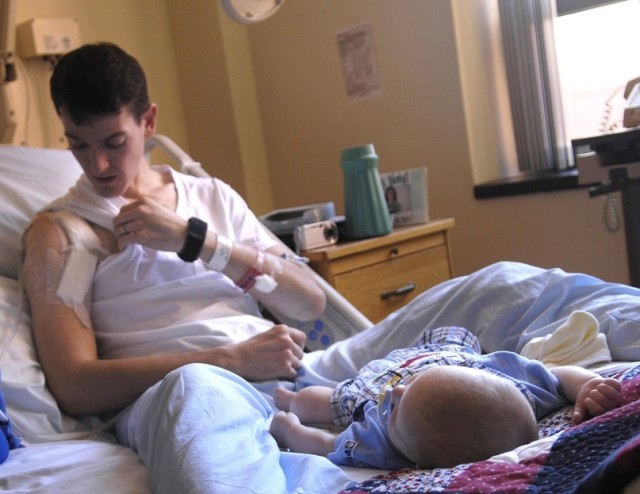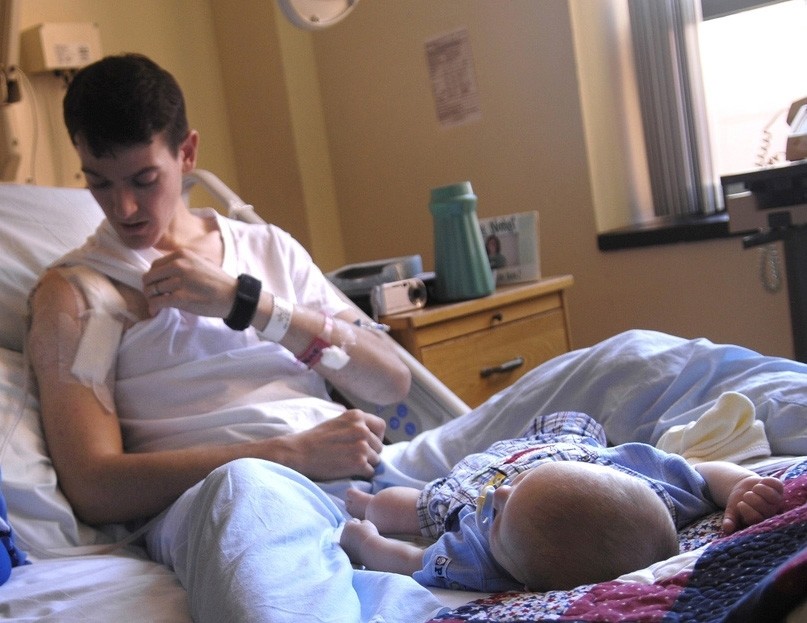
WASHINGTON (Army News Service, Feb. 29, 2008) - A change in healthcare begins March 1 across the Army, the Department of Defense and the nation, said the executive officer for the assistant surgeon general for warrior care and transition.
Lt. Col. Marie Dominguez said the new six-phase Comprehensive Care Plan will help the Army not only heal a Soldier's particular injury, but make sure its wounded warriors are healed in body, mind, heart and spirit and increase the chances that they will return to duty or become successful veterans.
Dr. Dominguez has been nominated to be the special advisor for Department of Defense-Department of Veterans Affairs integration to Secretary of the VA James Peake.
<b>Myriad of Issues</b>
Soldiers are "in the Warrior Transition Units because they have some sort of profile that prevents them from performing their duty in their regular unit or they need complex medical attention," she said. "What we discovered is that it's not usually just one problem that they have. A lot of our Soldiers have relationship difficulties. They may have medical problems. They may have joint problems. They may have pain problems.
"We said that we really need to look at this from a whole-person concept, instead of just focusing on their sore need, and while they're here, because they have some time, let's sort of do a general tune up."
<b>WTU Reception Phase</b>
Soldiers' are welcomed to the WTU when they are still inpatients in the hospital. The nurse-case managers will introduce themselves and work with their teams of specialists to learn their care plans.
When Soldiers begin their reception phase at the WTU, they meet their triad of primary-care manager, squad leader and nurse-case manager, in addition to their battle buddies. They learn their rights and responsibilities, as well as the WTU's rules and regulations.
The nurse-case managers will perform risk assessments on the Soldiers: can they drive' Do they have medication problems' Are they at risk for suicide'
<b>Phase 2: Assessment</b>
Next comes the assessment phase when doctors, physical and vocational therapists, mental-health workers, social workers and others will evaluate the Soldiers in the four areas of body, mind, heart and spirit.
Physical well-being not only means the Soldiers are healing and going to physical therapy, it can mean they need to get back into shape or start weight-loss programs, Dominguez said, especially if they want to return to duty.
In the area of the mind, Dominguez said, the Army will pay close attention to Soldiers who have traumatic brain injuries and provide neurocognitive testing, and check for speech and language problems, problem-solving skills and concentration skills.
Experts will take a close look at Soldiers' abilities and interests, what kind of jobs they want to do and what they can do. Most importantly, the Army is going to provide educational and vocational training for Soldiers in WTUs, and Soldiers will be required to participate as much as they are physically and mentally able.
<b>Heart and Soul</b>
In the area of the heart, medical officials will examine Soldiers' relationships, how they are able to resolve conflicts and any socially unacceptable behaviors.
Col. David Reese, director for ministry initiatives at the Office of the Chief of Chaplains, said the Strong Bonds program of marriage retreats is being expanded to meet the specific needs of wounded Soldiers and their Families. In addition to the regular curriculum focusing on communication skills, the program will be handicapped accessible and provide forums on challenges specific to them, such as grief and loss. Some chaplains have already begun offering specific weekends to wounded warriors and their Families on an informal basis.
Dominguez said that spirit can include anything from religious support -- Reese said chaplains will be assigned to all WTUs at the battalion level -- to hobbies Soldiers' enjoy. She said officials are especially concerned when Soldiers' injuries make their previous hobbies impossible. What would a Soldier who liked to paint but has been blinded do for a hobby' Dominguez said they might help him or her learn to sculpt, for example.
<b>Phase 3: Setting Goals</b>
Then Soldiers, their Families and triads gather for the goal-setting phase and talk about the Soldiers' goals while they're in the WTU and the milestones they need to meet to achieve those goals.
The goals can range from walking by a certain date to improving their relationships to starting their degrees. Dominguez added that Family support, both in this phase and throughout the process, is crucial in helping the Soldiers heal and keeping relationships strong.
<b>Phase 4: Active Rehabilitation</b>
Soldiers start working on these goals during the next phase: active rehabilitation. Soldiers first get classes on finances and benefits, maintaining body weight and physical fitness after injury or illness, maintaining a healthy relationship, medication management and avoiding addiction, the post-traumatic stress chain-teaching program and battle-buddy skills.
Then Soldiers begin their educational or vocational activities during part of the day while continuing their medical treatments. Dominguez said they encourage Soldiers to take classes online because of portability, but if a Soldier needs a physical class, she said they'll provide that as well.
Dominguez added that the Soldiers can also learn job skills through apprenticeships and internships. Ideally, she said, the Army will have an opportunity to provide on-the-job training, especially if the Soldier wants to return to duty. In addition, many local organizations and even Microsoft are providing opportunities to wounded warriors and Dominguez said the Army can provide transportation if necessary.
<b>Phase 5: Transition</b>
As the Soldiers complete their treatments and wait for their medical evaluation and physical evaluation results, they'll spend more and more time in these activities. Then they enter the transition phase. Soldiers who are separating from the Army have up to 90 days to arrange for veteran's benefits, find a job, get into school, and find a place to live with Army experts on hand to help and ease the transition. The final phase is out-processing.
<b>Phase 6: Outprocessing</b>
"We are going to survey our Soldiers, 30 days and 60 days out to see how are they doing, and if they are having problems, we're going to contact the VA counselor and say 'We've got a Soldier who just transitioned and they're really having some difficulties. We need to get you involved.'
"That should result in a smooth transition for these Soldiers. We'll be working together with the VA, because once they leave the Army, we still feel that they're our Soldier and we want to make sure that they're taken care of so we want to coordinate with the VA well," Dominguez said.

Social Sharing